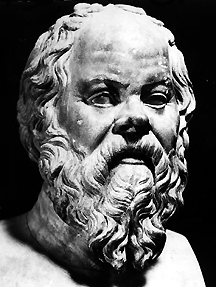
Socrates is the father of this line of thought in which philosophical enquiry is challenging the dull pseudo certainties on which the ruling classes rely to secure their power and its abuse. Of course he was condemned and poisoned by the Athenian elders but the seed of his teachings is brilliantly alive in every seeking man.
We must reject the conception of education professed by those who say that they can put into the mind knowledge that was not there before – rather as if they could put sight into blind eyes.
Our true lover of knowledge naturally strives for reality, and will not rest content with each set of particulars which opinion takes for reality, but soars with undimmed passion till he grasps the nature of each things at it is, with the mental faculty fitted to do so, that is, with the faculty that is akin to reality, and which approaches and unites with it.
All those individuals who make their living by teaching, and whom the public call “sophists” and envy for their skill, in fact teach nothing but the conventional views held and expressed by the mass of the people when they meet; and this they call a science.
“So philosophy is impossible among the common people.
-Quite impossible.
“And the common people must disapprove of philosophers.
-Inevitably.
“So also will all individuals who mix with the crowd and want to be popular with it.
-That is obvious”.
The object of our legislation is not the special welfare of any particular class in our society, but of society as a whole.
You must therefore each descend in turn and live with your fellows in the cave and get used to seeing in the dark; ounce you get used to it you will see a thousand time better than they do and will distinguish the various shadows, and know what they are shadows of, because you have seen the truth about things admirable and just and good. And so our states and yours will be really awake, and not merely dreaming like moist societies today, with their shadow battles and their struggles for political power, which they treat as some great prizes.
But what we need is that the only men to get power should be men who do not love it.
There will be no end to the troubles of states, or indeed, my dear Glaucon, of humanity itself, till philosophers become kings in this world, or till those we now call kings and rulers really and truly become philosophers and political power and philosophy thus come into the same hands.
Socrates through Plato in The Republic